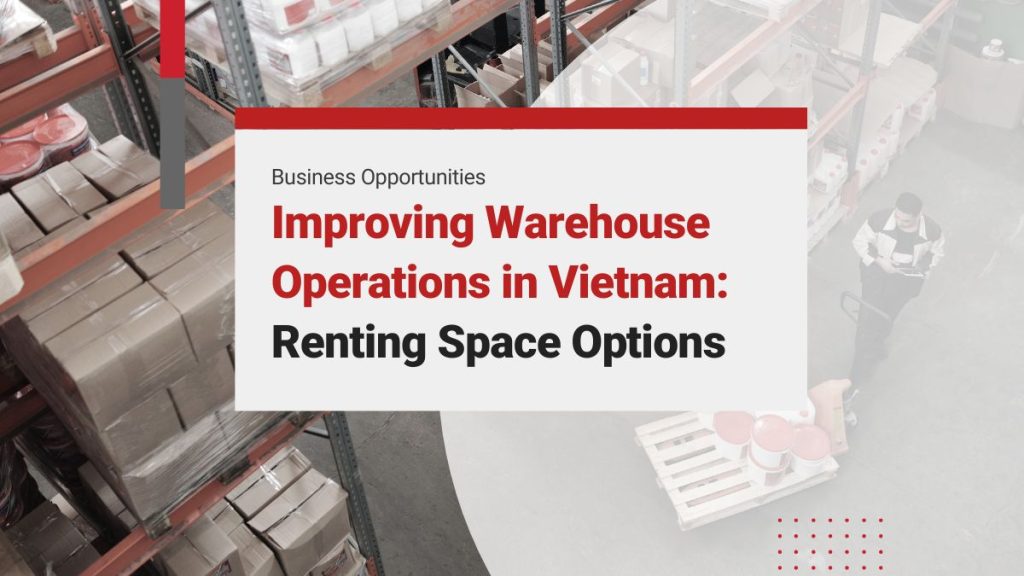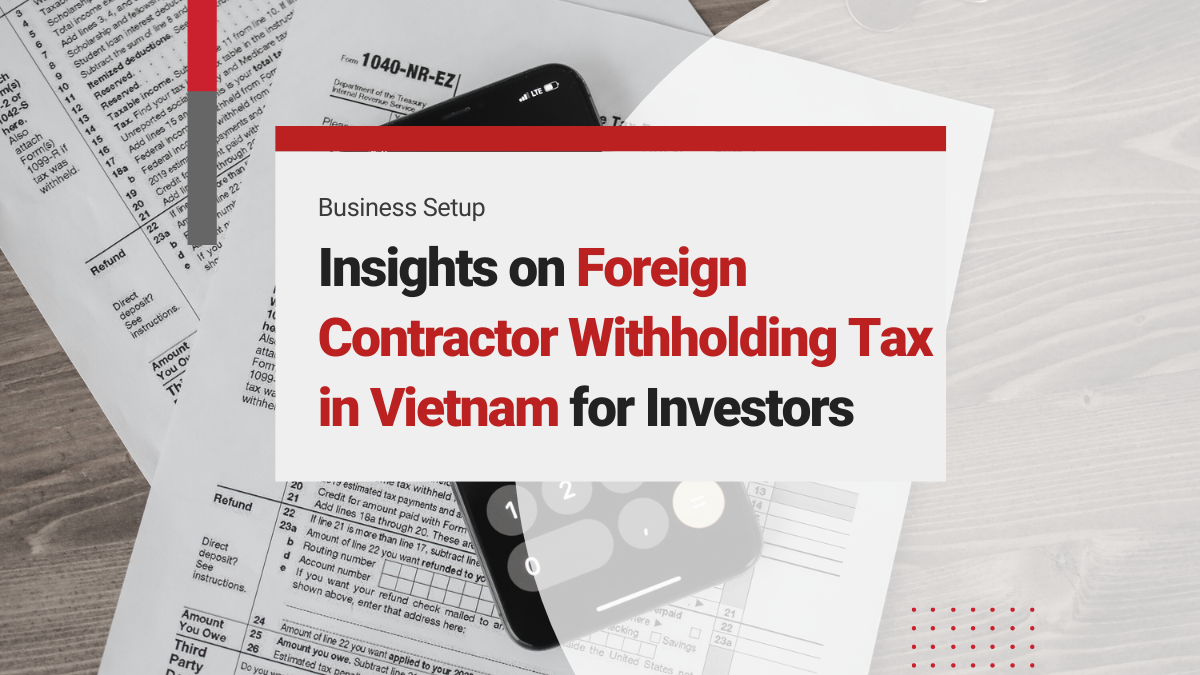With the expansion of businesses in Vietnam, there is a growing demand for large warehouses, particularly within the logistics sector. These warehouses provide the necessary space for businesses to function and expand efficiently. As businesses expand their operations, many are also exploring company formation in Vietnam to establish a stronger local presence and manage logistics more effectively.
Warehouse operations are central to a company’s success, and warehouse professionals must possess the skills and knowledge to ensure that business operations can run smoothly. By implementing best practices, companies can optimize their warehouse operations to their fullest potential. The following article provides a range of strategies to enhance warehouse operations, aimed at reducing costs and increasing customer satisfaction.
Overview of the Vietnam Warehouse Market
According to Expert Market Research (EMR), the Vietnam warehousing market is projected to grow at an 11% Compound Annual Growth Rate (CAGR) from 2022 to 2027. The factors that will drive this growth include the following:
- Growing population
- Rapid urbanisation
- An expanding warehousing sector in Southeast Asia
The Asia-Pacific warehousing service sector is experiencing rapid growth, driven by ASEAN countries and major economies like China and India. China’s swift recovery from COVID-19 has accelerated its logistics industry evolution, particularly in the e-commerce sector.
Until now, the primary route for transporting goods was from Asia to the United States and Europe through East-West trade routes. However, there has been a recent shift towards intra-Asian trade. China, Japan, and South Korea have established modern container ports in other Asia-Pacific nations and are investing significant funds to enhance logistics infrastructure.
As for the cold chain market (cold storage and transportation), the Americas region will have the biggest market share within the period 2020-2025. For this, Vietnam’s warehouse sector stands to benefit for several reasons:
- Strong connectivity exists between urban areas, particularly tier 2 and tertiary cities, facilitating transportation.
- Implementing modern technologies like enterprise resource planning, GPS, RFID (Radio Frequency Identification), and drones will enhance logistics services.
- Positive macroeconomic conditions, combined with 16 Free Trade Agreements fostering trade ties between Vietnam and neighboring Asian countries, will continue to bolster industry expansion.
Read Related: Moving to Vietnam for Chinese Businesses: What are the Benefits?
Recent advancements in warehousing activities, including those in Vietnam, have been significant. However, the emergence of COVID-19 in early 2020 had detrimental effects on the economy and trade, severely disrupting logistics operations, including transportation, warehousing, and the exchange of goods.
In the post-COVID-19 era, the global warehouse markets have played a crucial role in the recovery of international trade, supported by governmental policies. Despite this progress, the sector continues to face challenges, including labor shortages and reduced demand. These issues underscore the importance of implementing robust anti-epidemic measures within logistics processes.
Reasons to Build a Warehouse Vietnam: A Strategic Perspective
Vietnam’s business landscape and the demand for expansive warehouse facilities, particularly within the burgeoning logistics sector, are expanding. The significance of warehouse space cannot be overstated, as it is a cornerstone for efficient business operations and growth.
Logistics, in particular, stands out as one of the fastest-growing industries, outpacing GDP growth. The country’s import-export figures, nearing US$390 billion in the first three quarters of 2020 alone, reflected a notable 1.8% increase from the year 2019. The industry’s trajectory remains promising with the Vietnamese government, aiming for an ambitious annual logistics growth rate of nearly 20% by 2025.
Vietnam’s emergence as ASEAN’s premier industrial hub over the past two decades underscored its aspirations to become an export-oriented economy. This vision necessitates substantial imports of raw materials followed by the export of finished goods, fueling further growth in logistics activities.
The ongoing trade tensions between the United States and China, coupled with the disruptive effects of the pandemic, have prompted businesses to diversify their supply chains. Many have adopted the “China plus one” strategy and are relocating operations from China to Vietnam. This influx of investment has significantly bolstered the country’s manufacturing and assembly sectors, further driving demand for warehouse facilities.
The COVID-19 pandemic has accelerated the e-commerce boom, amplifying the need for warehouse space, particularly in Tier 2 and 3 cities. This surge in demand has predominantly been met by a combination of Grade A, B, and C warehouses, with preferences shifting that offer greater automation and efficiency.
Read More: China +1 Strategy in Vietnam: An Overview for Chinese Investors
Requirements for Establishing and Operating a Warehouse Vietnam
The initial consideration that you must remember is the location. It is contingent upon your business needs, such as budget and accessibility. Subsequently, while adhering to local regulations, you must ascertain the necessary compliance requirements to successfully launch your warehouse in Vietnam.
Initially, the operation procedures for large warehouses can be categorized into two types. It includes:
- Legal Procedures
- Administrative Procedures
However, both play a crucial role in establishing enterprises’ economic standing. Whether you opt to rent a warehouse or construct your own, these procedures remain equally significant.
Initial Legal Establishment Documents
It encompasses IRC (Investment Registration Certificate), ERC (Enterprise Registration Certificate), tax code registration, stamp, and certification. IRC and ERC hold particular significance for enterprises.
IRC for Large Warehouse Operation
- As per the Law on Investment 2014, Article 3 defines an IRC as a recorded document containing information about an investment project submitted by an investor.
- As such, all enterprises providing warehouse or factory rental services must obtain an IRC.
ERC for Large Warehouse Operation
- According to Article 4 of the Enterprise Law 2014, an ERC is a document issued by competent authorities containing registration information for an enterprise.
- Whether owning or renting a ready-built warehouse, enterprises must possess an ERC.
Tax Code for Large Warehouse Operation
- To initiate large warehouse operations, companies must register for a tax code.
- This code, consisting of numbers, is granted to individuals or organizations paying taxes.
Documents to be Submitted to the Relevant Departments
Administrative Department
Establishing the office layout, training reception staff, and structuring the department are crucial steps in completing the administrative framework of an office. These steps are mandatory for all enterprises across economic regions, with particular emphasis on those renting warehouses.
Recruitment Department
Following the completion of the manufacturing plant, recruitment and personnel establishment are imperative for companies. Efficiently building and deploying human resources facilitates the execution of production strategies, minimizing downtime after facility stabilization.
Accounting-Legal Department
The accounting-legal department plays a crucial role in large warehouse operations by protecting the company’s interests and managing legal challenges effectively. This establishment is indispensable for preempting legal issues.
Enterprises must diligently recruit competent individuals for this department. However, this task may pose challenges, particularly for foreign enterprises unfamiliar with the local market landscape.
Establishing and Managing Large Warehouses in Vietnam? Explore InCorp Vietnam’s Incorporation Services in Vietnam
Top 11 Tips for Improving Warehouse Vietnam Operations
Improving warehouse efficiency is a multifaceted endeavor requiring attention to various operational aspects. Here are some key tips to enhance efficiency in your warehouse:
- Review Effectiveness: Conduct regular analyses to ensure optimal resource utilization and identify areas for improvement throughout the warehouse operations. Addressing inefficiencies comprehensively ensures a streamlined workflow.
- Warehouse Layout: Maintain an organized warehouse layout to facilitate smooth navigation and minimize safety hazards. Utilise technologies like RFID (Radio Frequency Identification) to track locations and enhance efficiency in locating and retrieving inventory.
- Forecast Ahead: Anticipate shifts in demand by implementing business software systems with demand forecasting capabilities. Real-time tracking technologies such as RFID aid in monitoring inventory movements and providing insights for accurate forecasting.
- Picking Methods: These include several types, such as Random Picking, Zone Picking, Bundle Picking, Group Picking, and Wave Picking. The selection of a picking method depends on factors such as the size of your warehouse, the number of employees, and the frequency of employee assignments.
- Keep on Top of Stock: Avoid overstocking using RFID systems for real-time inventory tracking and reporting. This allows for better inventory management and adherence to FIFO (First In, First Out) and LIFO (Last In, Last Out) procedures.
- Clear Communication: Effective communication is essential for warehouse efficiency. Establishing communication channels, setting warehouse standards, implementing performance management practices, documenting processes, and holding regular meetings facilitate this objective.
- Reduce Shipping Errors: Minimize shipping errors by implementing tracking identification technologies like RFID to ensure accurate loading and shipment of products. This reduces customer dissatisfaction and internal resource usage for error correction.
- Train your Staff: Provide comprehensive training to warehouse managers and staff to ensure that they understand how to use technologies effectively. Regular updates and feedback mechanisms help address issues promptly and foster a culture of continuous improvement.
- Omnichannel Warehousing: To meet the evolving expectations of modern consumers, businesses must adopt omnichannel fulfillment strategies. Omnichannel warehousing necessitates efficient coordination across various departments, including customer service, marketing, and accounting, to ensure a cohesive and responsive approach to consumer needs.
- Regular Audits: These are indispensable for identifying warehouse inefficiencies. This entails scrutinizing layout, detecting waste, and gauging employee productivity. By conducting these audits, you can monitor efficiency improvements and implement necessary adjustments, ensuring your warehouse operates optimally.
- ABC Analysis Method: The ABC analysis method categorizes inventory into three groups: A, B, and C, aiding inventory management. Group A comprises high-value items with infrequent sales but significant profit margins. Group B items sell faster than A but with lower margins, while Group C items are high-volume with low margins. Implementing this technique ensures efficient organization, accessibility, and streamlined ordering processes.
Outstanding Standards of Warehouses Vietnam
Most warehouses in Ho Chi Minh City are strategically located in areas with well-developed infrastructure to cater to businesses’ demands. Depending on the warehouse type, specific standards are in place to ensure safety, which includes
- Provisions for power supply,
- Water supply
- Drainage systems
- Fire protection
- Emergency exits
- Convenient transportation routes for business operations.
For instance, chemical warehouses adhere to safety protocols concerning fire and explosion risks. It must categorize chemicals to prevent hazardous reactions within the facility, per the standards outlined in TCVN 2622:1995.
Warehouses available for rent in Ho Chi Minh City boast top-notch quality within the region. Service standards in the city are renowned for their high level of excellence and quality. Therefore, renting a warehouse in Ho Chi Minh City offers five distinct advantages:
- This city is the key economic hub in Vietnam, boasting a large population, numerous businesses, and significant purchasing power, facilitating convenient business expansion.
- The city benefits from abundant and highly skilled labor resources that can handle basic and highly specialized tasks. This ensures businesses have access to a quality workforce.
- Renting warehouses and workshops allows enterprises to commence operations swiftly after contract signing. It optimizes operational timelines and ensures production and business efficiency.
- Ho Chi Minh City features an extensive network of seaports, highways, airports, etc., facilitating seamless inter-provincial and international freight transport and reducing distribution costs and time.
- Warehouses for rent in HCMC come with a range of support services, alleviating the burden of loading, container handling, security, trucking, and management tasks.
Read More: 9 Reasons to Launch Your Business in HCMC, Vietnam
Warehouse Rental Options in Ho Chi Minh City for 2024
The industrial real estate sector in Ho Chi Minh City is experiencing a notable upswing, driven by strong interest from both foreign investors and local businesses. According to data provided by Savills, the utilization rate of industrial parks in the city has reached 90%, with warehouse rental rates seeing a significant 10% increase year-on-year.
Several key factors that are contributing to this growth are listed below:
- Continuing Shift of Production from China to Vietnam: There is a noticeable trend of manufacturing operations relocating from China to Vietnam. Foreign companies are taking advantage of Vietnam’s favorable labor costs and business environment by moving their production facilities.
- Advancement of the E-commerce Sector: The rapid growth of the e-commerce industry is also driving demand for warehouse space in Ho Chi Minh City. E-commerce companies require warehouses for efficient product storage, smooth shipping, and prompt deliveries.
- Improvements in Infrastructure: Government investments in infrastructure in Ho Chi Minh City, such as roads, bridges, and ports, have improved the transportation of goods and raw materials. This progress in infrastructure has further increased the demand for warehouse facilities.
Expected to continue in the coming years, the strong demand for warehouse space is forecasted to increase. Savills projects that by 2025, industrial park occupancy in this city will likely reach 95%, accompanied by a further 15% rise in warehouse rental prices.
Additionally, the key trends shaping the warehouse rental landscape in Ho Chi Minh City include:
- Increased demand for larger warehouses: There is a growing need for spacious warehouses to accommodate the expanding size of shipments.
- Rising demand for warehouses in suburban areas: Businesses are showing interest in suburban warehouse locations to escape the high rents in the city center.
- Growing demand for climate-controlled warehouses: Due to the storage requirements of temperature-sensitive goods, warehouses equipped with climate-control systems are seeing increased interest.
Warehouse Service Providers in Vietnam as Solutions
While purchasing may seem preferable, renting warehouse space offers distinct advantages.
With a broader range of rental options available, you are more likely to find the perfect industrial warehouse space for your requirements. Additionally, securing a lease for business premises often takes less time than buying, allowing you to start using your new facility sooner.
Moreover, the initial expenses associated with leasing are typically minimal, significantly lower than those of buying a business property. Consequently, the money saved can be allocated towards expanding your company.
Furthermore, leasing a warehouse space entails fewer responsibilities for property maintenance. Service providers in Vietnam will restore and clean the facilities before your company moves in.
Relocating may become necessary in the event of business expansion. However, renters are not bound by property ownership, enabling you to move once your lease term ends. Thus, business owners can explore different locations to serve their needs better. Relocating after a lease expires is far more convenient than attempting to sell the property.
How can InCorp Vietnam Assist?
For over ten years, InCorp Vietnam has been the preferred one-stop business and outsourcing solution provider for clients. We aid companies by comprehensively grasping their business objectives and employing effective strategies to achieve them. Both local and international companies trust our expertise as we analyze their current situations and provide tailored recommendations and solutions.
To stay competitive, enterprises must have the support of business outsourcing and consultancy. By recognizing InCorp Vietnam as their go-to solution provider in Vietnam, successful organizations can confidently address performance gaps and surpass competitors.

clients worldwide

professional staff

incorporated entities in 10 years

compliance transactions yearly
InCorp Vietnam is a leading provider of global market entry services. We are part of InCorp group, a regional leader in corporate solutions, that encompasses 8 countries in Asia-Pacific, headquartered in Singapore.

clients worldwide

professional staff

incorporated entities in 10 years

compliance transactions yearly
Learn the Right Setup for Business
Expansion in the Vietnam
Frequently Asked Questions
What is a warehouse?
- A warehouse is a commercial building or facility used for storing goods, raw materials, or finished products. It is commonly used by manufacturers, importers, exporters, wholesalers, and logistics providers to facilitate inventory management and distribution. In business operations, warehouses are critical for supply chain efficiency and order fulfillment.
What's the difference between a warehouse and a store?
- A warehouse is a facility primarily used for storing goods in bulk before they are distributed or sold, often serving as a logistical hub in the supply chain. A store, by contrast, is a retail space where goods are displayed and sold directly to customers. Warehouses are typically not open to the public, while stores are designed for consumer access and transactions.






